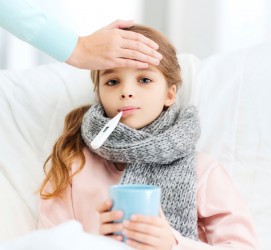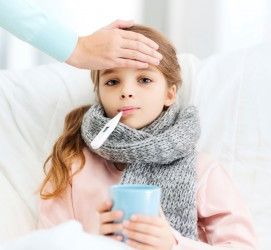 Flu Season: Here’s What You Need to Know
Flu Season: Here’s What You Need to Know
Not to completely freak you out, but here’s a scary fact: so far, the 2014-2015 flu season has claimed the lives of 21 children, and reported infections are on the rise. Forty-three states reported influenza activity last week, up from 36 states the week before that. And to top it all off, the CDC announced last week that this year’s vaccine is not as effective because the current strain has mutated. With kids back in school and the rest of us back at our germy workplaces, now’s a great time to step up those hand-washing skills.
We spoke with Ashwin Jathavedam, MD, Infectious Disease Specialist at Englewood Hospital and Medical Center this week to get the 411 on how best to stay flu free this season.
Bergen Mama: Should we be more concerned about flu season this year than previous years?
Dr. Jathavedam: There’s reason for concern because we started seeing a big uptick of flu cases in December, both in hospitals and clinics, whereas in the last few years, flu season didn’t get going until mid to late January. But the virulence does not appear to be more severe than in past seasons.
Bergen Mama: Tell us about the strain. Is the current flu vaccine even effective?
Dr. Jathavedam: There has been a lot of press coverage based on the CDC’s recent announcement. It’s a false statement to say that the vaccine is not effective. The current vaccine provides a lot of protection. The way vaccines work, scientists pick proteins from the three most common circulating flu strains. They have no way of knowing exactly which strain will be the most common come flu season, so this is educated guesswork. What happened this year is that two of the three strains in the vaccine are good matches; one is not. You never know what the predominant strain will be until after the fact.
Bergen Mama: Should we still get the vaccine if we don’t have it already?
Dr. Jathavedam: Absolutely. Anyone who is pregnant, or who has small children at home should definitely get the vaccine. Next, anyone who comes in contact with pregnant women or small children – husbands, nannies, grandparents – if you think about it, that’s everyone. Anyone and everyone has the potential to contract the flu and expose someone who is at risk.
Bergen Mama: How do you know if it’s the flu, and not just a bad cold or a bad dinner?
Dr. Jathavedam: A high fever. 101 degrees signifies a high fever. There are other symptoms that can mimic the flu (headache, nasal congestion, stomach upset), but if you don’t have a fever, it’s unlikely to be the flu. But I will also say – if you or your kids experience the constellation of these symptoms this time of year, there is a good chance that it’s the flu, especially if you were exposed to someone else.
Bergen Mama: Then what? What’s the best way to treat the flu?
Dr. Jathavedam: There are very good medications to treat flu, so call your doctor right away. You’ll want to get on the anti-viral medications within 48 hours. For people who wait longer, the anti-virals are much less effective. Also: Don’t plan on returning to work or school until 24 hours after your flu symptoms subside (no fever for 24 hours) which usually means 4 – 5 days from onset.
Bergen Mama: What are the emergency signs that my child really isn’t doing well?
Dr. Jathavedam: If your child is having trouble breathing, their color doesn’t look right, they are lethargic, or having seizures, call your doctor right away. For adults, it’s usually the pneumonia that comes afterwards that is the real danger. Again, get to the doctor right away.
Bergen Mama: Who is at the highest risk?
Dr. Jathavedam: Kids who have asthma, or other cardio-pulmonary disease are at higher risk than others, but healthy kids can suffer complications of the flu too. Also: pregnant women are high risk, and so are adults in nursing homes or the elderly in general.
Bergen Mama: What’s the best prevention?
Dr. Jathavedam: Avoiding contact with people with the flu and hand washing are your best defenses. Given the choice between hand sanitizer and hand washing, hand washing is always better. Sing the happy birthday song twice, or count to 10, with plenty of suds and water.
Additional resources:
Flu information for Parents With Young Children (CDC)
Flu: A Guide for Parents (CDC)
Children & Infants at Risk for Flu (Flu.gov)
New Jersey Department of Health






